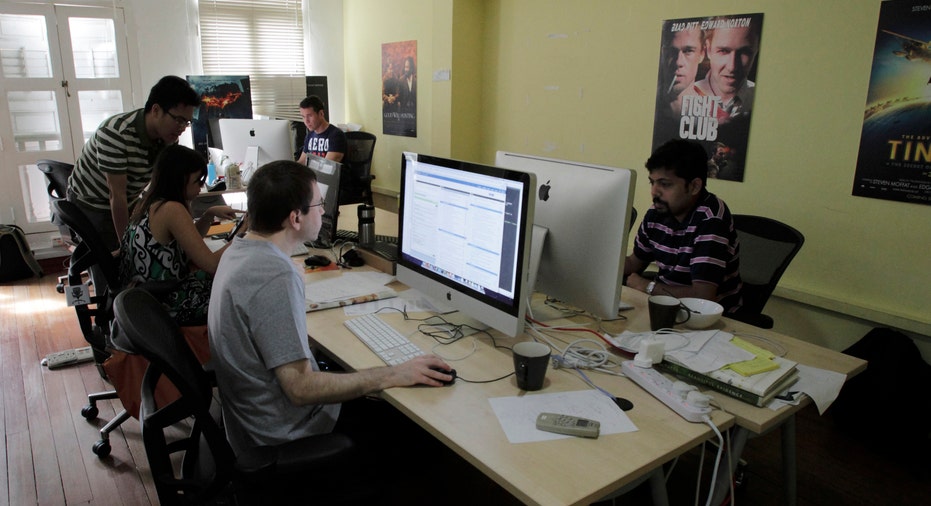Crowdsourcing Business Ideas: How to Do It

When you think of crowdsourcing, the first thing that probably comes to mind is fundraising — dozens (or hundreds) of individuals pooling together small amounts of money that add up to a big payoff for the business or organization. But crowds can offer another valuable resource: innovation. Small businesses that crowdsource ideas and solutions through contests, consumer voting and other online interactions can stretch their limited resources and get the results they want quickly, efficiently and affordably.
"The beautiful thing about crowdsourcing is that it's usually low risk," said Griff Hanning, founder of socially minded crowd-publishing platform, CausePub. "It costs next to nothing to figure out if your ideas are worth pursuing or need changing. Figuring this out early in the game could save you thousands of dollars later on."
What can the crowd do for your business? Here are some of the benefits of offering an open invitation to innovate, and a few tips to keep in mind for crowdsourcing success.
The power of the crowd
If you want to create or update a product, implement a new customer service strategy or even just get involved in a charitable cause that matters to your consumers, then who better to ask for input than the people that those changes will directly affect? Asking your clients and employees what they want to see instead of relying on yourself and a small team of advisers will bring in a much wider range of perspectives, which can help you better serve your customers.
"The power of the crowd is the ability to draw from the collective memory, expertise and experience of many people at the same time," said Jessica Greenwalt, founding member and lead designer of crowdsourced medical diagnosis platform, CrowdMed.
Perhaps even more beneficial than this collective wisdom is the brand loyalty you can build just by making customers feel like they are truly shaping your company's future.
"If you want people to be emotionally connected to and invested in your business, everyone has to think they matter as a customer," said Jon Olinto, co-founder of the b.good Family Foundation, which puts its annual grant recipient up to a consumer vote. "As long as you're willing to turn some decisions over to the customers, you can empower them. Anyone who participates is automatically engaged with the company and part of its story."
Regulating the influx of ideas
While there are numerous benefits to crowdsourcing, you may not necessarily want to open up important business decisions to anyone who happens to have an idea.
"Crowdsourcing is a call-out to the world to come up with ideas," said Stephen Benson, global vice president of co-creation at market research and technology firm Vision Critical. "The problem with this model is that it assumes everyone is a creative equal. It's chaos having to sift through a large amount of ideas to find the gem."
Vision Critical takes a monitored "co-creation" approach to idea submission. The company recently released a service called IdeaHub, which allows businesses with an innovation challenge to receive high-quality insights that have been vetted and evaluated by members of its community. Benson said the most important thing business owners can do in a crowdsourcing situation is to take a deep look at their businesses and know what information and tools are going to be the most relevant to what they need. When crowdsourcing a project, make sure you have a dedicated team who knows what to look for when organizing and sorting through the ideas, so you aren't wasting your time.
Tips for crowdsourcing ideas
If you're thinking about launching a crowdsourcing campaign for your next business project, here are a couple of tips to keep in mind:
- Be creative, and experiment. "So many things are being opened up to crowdsourcing that were once exclusively the domain of individual experts," Greenwalt told BusinessNewsDaily. "In James Surowiecki's book, 'The Wisdom of Crowds' [Anchor, 2005], he shows how crowds can be more accurate than an expert. I say, experiment with crowdsourcing. The results may surprise you."
- Don't try to appeal to everyone. Crowdsourcing may seem like you should be reaching out to anyone with access to the Internet, but Hanning cautions that appealing to everyone could set you up for failure."Keep your message clear and direct," he said. "Don't be afraid to take a side. You'll be hated by some and loved by others, but it's better than confusing everyone and getting zero participation."
- Build a community and make people care. The b.good Family Foundation is a branch of b.good, a burger franchise that prides itself on fresh, real ingredients. Olinto said the foundation's crowdsourcing approach to distributing its social-cause grants stemmed from a desire to build relationships with customers beyond the burger. "Consumers want to know that the companies they support are socially responsible," he explained. "If consumers care, they're going to participate."
Originally published on BusinessNewsDaily.



















